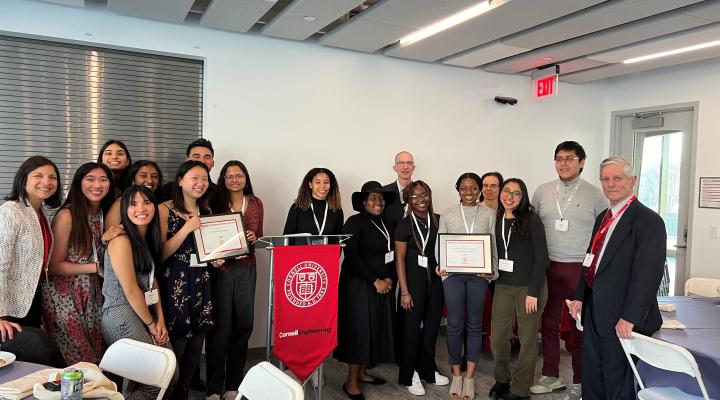Jacob Mays joined the faculty of Cornell’s School of Civil and Environmental Engineering (CEE) as an assistant professor in July 2020. Before joining Cornell as a faculty member, Mays spent a year here as a postdoctoral associate.
Mays, who grew up in the Kansas City area, was at Northwestern University earning his Ph.D. in industrial engineering and management sciences before coming to Ithaca. While earning his doctorate, Mays also had a position as a student trainee at the Federal Energy Regulatory Commission (FERC). FERC is responsible for ensuring that consumers in the United States have economically efficient, safe, reliable, and secure energy. Mays enjoyed his three years at FERC, saying “Part of what makes electricity systems so fun to study is that they can be viewed through so many disciplinary lenses—including physics, engineering, economics, finance, policy, and law.” Mays’ time at FERC gave him a chance to look through some of these lenses.
At Cornell, Mays’ research focuses generally on design and analysis of electricity markets, with an interest in applying optimization and statistical learning in energy systems.
As the country shifts away from relying on coal, oil, gas, and nuclear power and builds up its solar, wind, geothermal, and other alternative sources of energy it is becoming abundantly clear that electricity markets need to evolve to better reflect the current (and future) mix of suppliers. Solar and wind power, for example, are sporadic and it can be difficult to incorporate them efficiently into existing systems that are built around the expectation of a consistent and predictable flow of electricity.
To an extent, engineers have a good understanding of the technical questions that will need to be answered in order to create these more flexible electricity markets. But the technological questions are only part of puzzle. “We have to also be aware of the economics and the legal aspects of energy to really do effective work,” says Mays.
Mays says that he “liked all sorts of subjects in high school, but definitely spent the most time on math. He also played baseball, basketball, and soccer, and sang in several choirs. He went to Harvard for his undergraduate studies, earning bachelor of arts degrees in both chemistry and physics. He completed an M.Eng. degree in energy systems at the University of Wisconsin-Madison.
Mays then worked as a consultant for the Oliver Wyman international management consulting firm for three years. His time at Oliver Wyman is what led to a career in academia. Mays was part of a group working on optimization software for rail planning. “That was my introduction to mathematical optimization,” says Mays, “which is now the core methodology I use in my work. I saw the work that group was doing and found it fascinating and that is what led me to apply to the Ph.D. program at Northwestern.”
Mays is thrilled to be at Cornell, where he can combine his knowledge of energy systems with mathematical optimization to have a real effect on energy systems and electricity markets. “It would be an easy decision for anyone in my position to join Cornell,” says Mays, “given the caliber of the faculty, staff, and students as well as the beauty of the Ithaca area. But it was an especially easy decision for me, since my wife Bethany is an assistant professor of human development at Cornell.”
In the fall semester 2020 Mays will be teaching ENMGT 5200: Economics of the Energy Transition and in the spring semester 2021 he is planning to teach BEE 4880: Applied Modeling and Simulation for Renewable Energy Systems.




